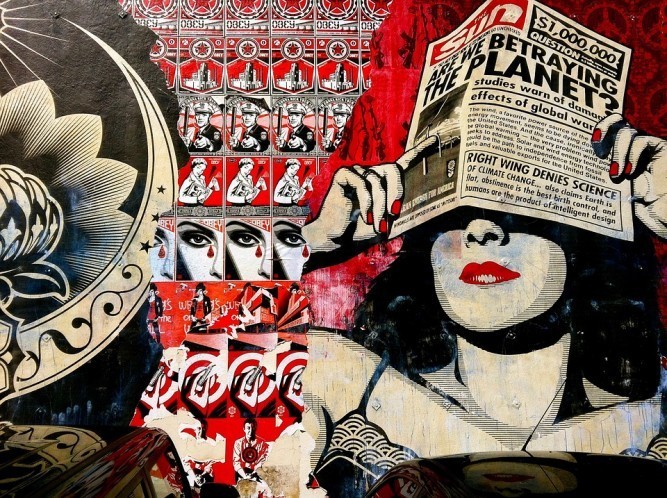
Originally appeared at Return of Kings
In May of this year, a bill was introduced in the US Congress called the “Countering Information Warfare Act (CIWA) of 2016.” It is currently pending in the Committee on Foreign Relations. The premise behind the bill is, in essence, that Russia and China are devoting huge sums of money on “propaganda” and “disinformation” which has the net effect of smearing US policies around the world.
Advocates of the bill note that Russia allegedly devotes significant resources to its 24-hour news site rt.com. It also apparently funds the Orwellian-named “Agency for Internet Studies.” This last organization has been called a “troll farm” and is supposed to be the source of a fake video showing a US “soldier” firing a gun at a Qur’an that was circulated widely in Russian Muslim communities.
Proponents of the bill note that disinformation and propaganda can take various forms. One form is the “accurate” news story that draws a “false” conclusion. Another form is the totally fake “news” story. Such disinformation is also seeded among news outlets in the target country, with the assumption that lazy native journalists will spread the story without checking on its veracity.
China’s propaganda and disinformation exceeds that of Russia by several orders of magnitude. As Michel Juneau-Katsuya, the former chief of the Asia-Pacific Bureau of the Canadian Security Intelligence Service, said: “The sheer volume of spies that have been deployed—it’s just absolutely phenomenal. It’s never been seen in the history of the world.” On the domestic front, China uses false stories and disinformation to discredit dissident groups like the Falun Gong or to cover up human rights abuses, environmental crimes, or massive commercial fraud.
In one recent example of pure disinformation (from 2001), the Chinese media claimed that five members of the Falun Gong sect had set themselves afire in Tiennamen Square. The incident proved to be a hoax, but it served its short-term purpose in providing a pretext for the persecution of the group.
Some of this is an expected part of the new tri-polar world power system. Great powers of every era have engaged in “black ops” propaganda: election rigging, disinformation, subversion, and nastier activities. But what we are seeing now seems to be an escalation of propaganda into a virtual arm of warfare. As the great powers hesitate to confront each other militarily, the zone of conflict shifts into the electronic realm.
Chinese military doctrine emphasizes what it calls the “three warfares”: legal warfare (lawsuits and administrative entanglements), psychological warfare, and media warfare. Agencies of the Chinese government and military are specifically tasked with carrying out operations in support of this theory. The United States has been slow to respond; and when it has responded, the effect has been feeble or inept.
If the CIWA passes, it will task the State Department with the responsibility of tracking and countering foreign disinformation. Within six months of the bill’s passage, there would be established something called the Center for Information Analysis and Response. This office would have direct connection with the State Department, the Secretary of Defense, and the Broadcasting Board of Governors. Cynics (or realists) might say that for the first time the government will have the power to screen and evaluate “news” for authenticity. CIWA thus represents a significant official intrusion into the way news is culled and reported by the mainstream media.
But troublesome questions remain. The first problem is that too many vested interests are likely to be threatened for the bill to have any practical effect. Chinese money has been liberally spread around the US for many years now, and their fingers are in a great many pies.
Many US news outlets like the New York Times, the Washington Post, and others are willing to run propaganda stories from the China Daily (Beijing’s English-language organ) as long as they are paid well. Some large news organizations are conglomerates who have major financial investments in China. The existence of paid agents masquerading as journalists also cannot be ruled out.
Beyond these practical considerations, there are more subtle and troubling implications of CIWA. As a practical matter, it would have the effect of deciding what information is “true” and what information is “disinformation” or “propaganda.” As everyone knows, the boundary between these categories is not always clear; one man’s news may be another man’s disinformation.
Unfortunately, years of incompetence and ineptitude on the part of the US government have given the US’s enemies much of the ammunition they currently use. Lax immigration policies and greed have allowed too much Chinese influence in US industry, universities, and the economy. The greed and selfishness of US industry has permitted the wholesale dismantling of America’s industrial base and caused it to be outsourced to China.
On the international scene, years of stupid, ruinous foreign wars have destroyed the US’s credibility and made it vulnerable to atrocity propaganda. The ruling elites in the US have failed to act as stewards of the national health and interest; instead, they have sought to plunder the country’s wealth for their own selfish gain. If there ever is an honest reckoning, the price for all this will have to be paid.
It is easy to imagine a scenario where CIWA becomes the genesis of the most subtle and insidious form of censorship: the official labeling of unwanted truth as “disinformation.” Fraud, hoaxes, and disinformation undoubtedly do happen, but the selective exposure of them often operates as a de facto form of censorship. The only way to guard against creeping censorship—of whatever form—is for the intellectual class to maintain its vigilance. Threats to national security are no doubt real. But they must never be used as pretexts to enforce a certain narrative on the population.



